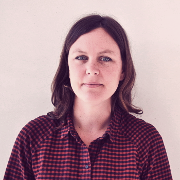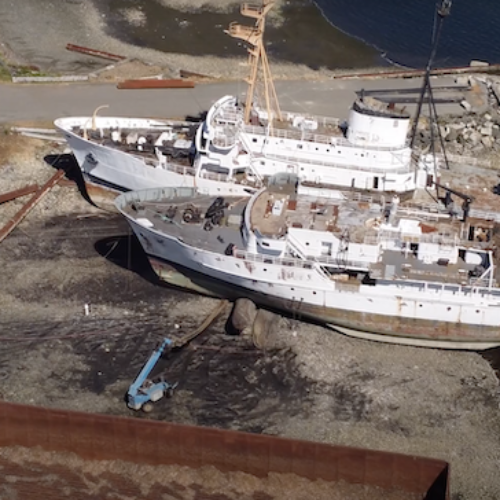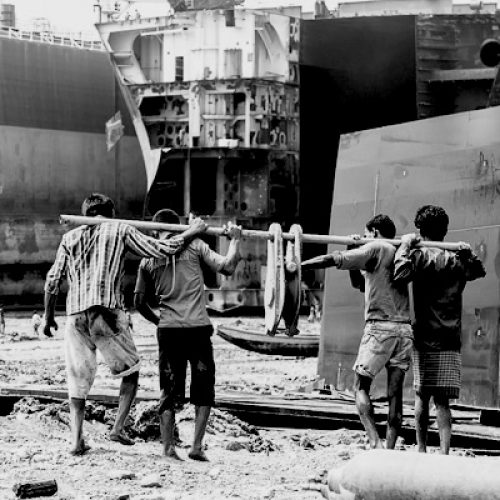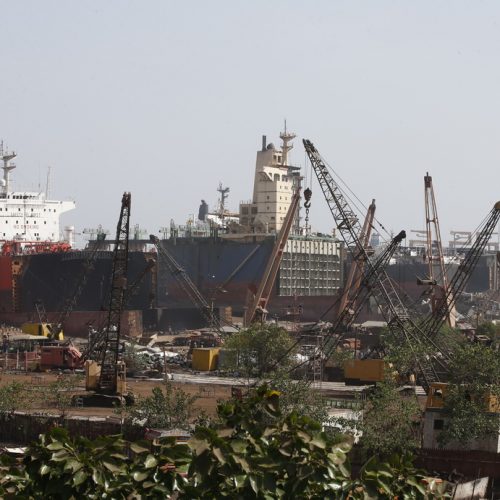Press Release – Norwegian Central Bank excludes companies from government Pension Fund Global because of their beaching practices
Evergreen and Precious Shipping loose investments from the largest sovereign wealth fund in the world
The Norwegian Central Bank announced today its decision to exclude ship owners Evergreen Marine Corporation, Precious Shipping, Korea Line Corporation and Thorensen Thai Agencies from the Government Pension Fund Global (GPFG) [1]. The exclusion is based on the companies’ poor management of their end-of-life ships and the sale of these for dirty and dangerous shipbreaking on the beaches of Gadani, Pakistan and Chittagong, Bangladesh.
The Norwegian Council on Ethics directs the Norwegian Central Bank, which manages the Government Pension Fund Global, on which companies should be excluded from investments in the fund, based on human rights and humanitarian violations, corruption and environmental degradation records. The GPFG is the largest sovereign wealth fund in the world, owning 1% of all investments worldwide, and the recommendations of the Council on Ethics weigh on other investors as indications of good financing.

The NGO Shipbreaking Platform has documented that in the last three years, 20 ships were sold by Evergreen, Korea Line, Precious Shipping and Thoresen Thai Agencies to beaching facilities in South Asia. The companies have been excluded from the GPFG because the beaching of their vessels cause severe environmental damage and serious human rights violations [2].
Whilst the exclusions so far are limited to companies that have sold their end-of-life vessels to be beached in Bangladesh and Pakistan, the reports clearly state that “to date, the Council on Ethics has not examined the way ships are broken up in India.” Many of the concerns raised by the Council also apply to the beaching practices in Alang, India. Indeed, as stated in their reports: “One particular problem with beaching is that shipbreaking takes place when the vessels are standing in mud and sand. As a result, the pollution leaches into the ground and is washed out with the tides. Even if arrangements were put in place at the beaching sites for the treatment of asbestos and PCBs, for example, the fundamental problem of containing and collecting the pollution would be impossible to resolve”. In light of this, the Platform encourages the Council on Ethics to also engage with companies that sell their ships for breaking on the beach of Alang, India.
According to the Council on Ethics, selling a vessel to a beaching yard “is a consequence of an active choice on the part of the company that owned the vessel to maximise its profit. In the Council’s opinion, that company must shoulder an independent responsibility for doing so. There are better ways of dismantling ships that are readily available to the shipowner, but these are more expensive”.

Bearing in mind that Taiwan used to be the destination for breaking ships before the boom of the industry in South Asia, it is particularly damning for Evergreen – a Taiwanese company – not to remember the legacy that the industry left in its country following the explosion in the port of Kaohsiung in 1988.

NOTES
[1] An additional company, the South Korean Pan Ocean Co Ltd, has been placed under observation. In its assessment of the likelihood that the company will in future contribute to such norm violations, the Council on Ethics has attached importance to the company’s assurance that it is willing in future to take the method of breakup into account as far as possible when making decisions on the sale of vessels for scrapping.
[2] The following serious concerns related to beaching are outlined by the Council of Ethics:
- continuous, innumerable and serious violations of a number of ILO conventions whose purpose it is to establish minimum standards which safeguard the lives and health of workers. Wide-ranging and serious violations of these conventions must be deemed to infringe fundamental rights to life and health, the sum of which must be said to constitute a serious breach of fundamental human rights.
- serious pollution and the dispersal of environmental toxins, which in turn have a negative impact on human health and ecosystems in the area.
Related news

The Toxic Tide – 2023 Shipbreaking Records
2023 shipbreaking records: most shipping companies continue to opt for the highest price at the worst scrapping yards.
... Read More
Press Release – Imminent breaking of asbestos-laden NOASS Miller Freeman worries NGOs and local residents of Union Bay, British Columbia
NGOs once again call upon B.C. federal, provincial and local competent bodies to halt the shipbreaking activities conducted by Deep Water Recovery LTD (DWR) at Union Bay.
... Read More
Press Release – Platform supports banks’ introduction of responsible ship recycling standards
Today, during the first day of NOR-Shipping in Oslo, Dutch banks ABN AMRO, ING Bank and NIBC, together with the Scandinavian DNB, announced that they are… Read More

Press Release – NGOs respond to legal threats by shipbreaking industry and withdraw from industry conference
On Monday, the NGO Shipbreaking Platform, an international coalition of labour, human rights and environmental organisations, withdrew their participation from the TradeWinds Ship Recycling Forum that starts… Read More

Platform News – Norway’s largest Pension Fund highlights human rights and environmental risks related to shipbreaking in South Asia
KLP, Norway’s largest pension fund [1], commissioned the International Law and Policy Institute (ILPI) [2] to write a report on the human rights and environmental risks related… Read More

Press Release – Europe has capacity to recycle its ships, new data shows – yet shipowners want to use dangerous, polluting yards abroad
Ship recycling yards approved by the EU will have enough capacity to handle demand from EU-flagged ships that need to be scrapped, a new analysis shows. The… Read More


